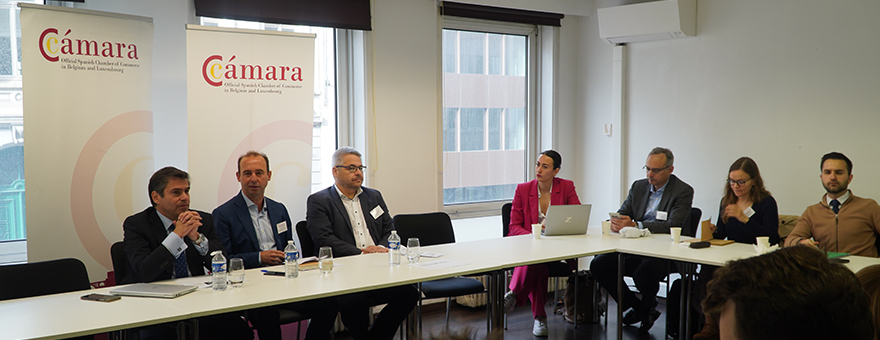Barna Kovács and Carlos Aldereguía explain the priorities of the Hungarian Presidency in the field of agriculture and fisheries
Last Thursday, 16 July, the Official Spanish Chamber of Commerce in Belgium and Luxembourg held a breakfast-debate with Barna Kovács, Counsellor for Agriculture, Bioeconomy, Research and Innovation, and Carlos Aldereguía, Fisheries Attaché at the Permanent Representation of Hungary to the EU. The presentation focused on the priorities of the Hungarian Presidency in the field of agriculture and fisheries.
The event began with a brief speech by the President of the Chamber, Pablo López-Alvarez, who introduced the speakers and framed the event in the beginning of the Hungarian Presidency of the Council of the EU.
As on previous occasions, the Chamber seeks to follow the Hungarian Presidency closely to offer its members the opportunity to learn about the priorities of the agenda from the counsellors themselves.
Counsellor Kovács, who is also secretary general of the BIOEAST initiative, which seeks to promote agricultural research through a strategic alliance of eleven Eastern European countries, gave several key points on agriculture from the Hungarian perspective.
He explained that the agricultural world in this region still uses traditional techniques and technology, which are outdated by modern European standards. BIOEAST’s approach to bridge this gap is to bring Eastern Europe directly to the forefront of agricultural innovation to radically modernise the sector.
A self-sustaining Europe
In addition, Kovács recalled that the current geopolitical context has disrupted global supply chains. For this reason, one of the main issues on the table is to promote the transition towards a more self-sufficient Europe, prioritising food security.
Regarding fisheries, Carlos Aldereguía contextualised the fact that the sector accounts for less than 1% of Hungary’s gross domestic product. Despite this, it is the driving force behind the so-called “blue economy” throughout Europe, and as the main priority of the Hungarian Presidency, Aldereguía mentioned the intention to promote the aquaculture sector.
“The environmental impact of aquaculture is minimal,” said the speaker, defending the position that, although aquaculture products do not have the best reputation, “there are no objective criteria for this to be the case”.
The presentation was followed by a Q&A session in which attendees raised questions related to industrial scalability in agriculture or investment in capital markets as a solution to the lack of technologies in Eastern Europe.


